 W
WA disc jockey, more commonly abbreviated as DJ, is a person who plays recorded music for an audience. Most common types of DJs include: radio DJs, club DJs, mobile DJs, and turntablists. Originally, the "disc" in "disc jockey" referred to shellac and later vinyl records, but nowadays DJ is used as an all-encompassing term to also describe persons who mix music from other recording media such as cassettes, CDs or digital audio files on a CDJ, controller, or even a laptop. DJs may adopt the title "DJ" in front of their real names, adopted pseudonyms, or stage names.
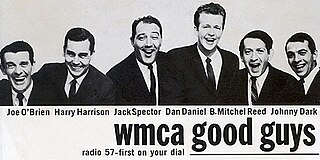 W
WThe history of radio disc jockeys covers the time when gramophone records were first transmitted by experimental radio broadcasters to present day radio personalities who host shows featuring a variety of recorded music.
 W
WBeatmatching or pitch cue is a disc jockey technique of pitch shifting or timestretching an upcoming track to match its tempo to that of the currently playing track, and to adjust them such that the beats are synchronised — e.g. the kicks and snares in two house records hit at the same time when both records are played simultaneously. Beatmatching is a component of beatmixing which employs beatmatching combined with equalization, attention to phrasing and track selection in an attempt to make a single mix that flows together and has a good structure.
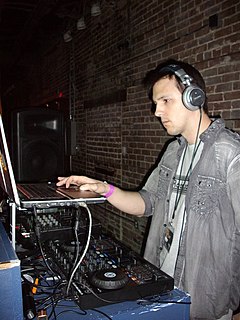 W
WControllerism is the art and practice of using musical software controllers, e.g. MIDI, Open Sound Control (OSC), joystick, etc., to build upon, mix, scratch, remix, effect, modify, or otherwise create music, usually by a Digital DJ or Live PA performer, often called a "controllerist". Controllerism is also a nod to traditional musicianship and instrumental-ism paired with modern computer sequencing software such as Ableton Live and Native Instruments Traktor. However a working knowledge of scales and chords is not necessarily required as the performers typically focus their efforts more on sequencing events, software effect and instrument manipulations using buttons, knobs, faders, keys, foot switches and pedals than on instrumental notes played in real time. With recent developments in music technology, particularly in software instruments, a USB MIDI controller enables musicians almost unlimited possibilities to control a wide variety of sound types.
 W
WTo cue audio is to determine the desired initial playback point in a piece of recorded music. It is a technique often used in radio broadcasting and DJing. One dictionary definition is to "Set a piece of audio or video equipment in readiness to play ."
 W
WDeckadance is a DJ console and mixing tool developed by Image-Line software and acquired in 2015 by Gibson. Initially released in May 2007, it operates on Windows and Mac OS X, and comes in a House Edition and Club Edition. The latter has support for timecoded vinyl.
 W
WA digital DJ licence is required in some countries, including the United Kingdom, Finland, Canada, Belgium and Italy, to publicly play digital copies of copyrighted music. The licence allows a DJ to copy music from original CDs, vinyl or other media, to a computer's hard drive, an MP3 player or other digital audio players, for example to be used with a vinyl emulation software program, or in some cases to other digital media, such as CD-R or MiniDisc. In the countries where digital DJ licensing is used, the licence is also required for playing music originally bought and downloaded directly on to a computer, usually in MP3 or similar format, unless the licence of the online music store explicitly allows the public performance of the downloaded tracks.
 W
WDisco is a genre of dance music and a subculture that emerged in the 1970s from the United States' urban nightlife scene. Its sound is typified by four-on-the-floor beats, syncopated basslines, string sections, horns, electric piano, synthesizers, and electric rhythm guitars.
 W
WDJ Awards is a celebration of electronic music, and aims to recognise and honour DJs, and individuals who have influenced electronic dance music worldwide.
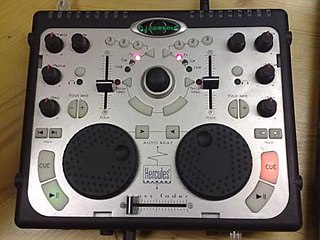 W
WDJ controllers are devices used to help DJs mix music with DJ software using knobs, encoders, jog wheels, faders, backlit buttons, touch strips, and other components.
 W
WDMC World DJ Championships is an annual DJ competition hosted by Disco Mix Club (DMC) which began in 1985.
 W
WA drop or beat drop in music, made popular by electronic dance music (EDM) styles, is a point in a music track where a sudden change of rhythm or bass line occurs, which is preceded by a build-up section and break.
 W
WIn audio engineering, a fade is a gradual increase or decrease in the level of an audio signal. The term can also be used for film cinematography or theatre lighting in much the same way.
 W
WThe Hard Sell is a live DJ mix album by American music producers and turntablists DJ Shadow and Cut Chemist, released in January 2007. The album is a recording of a rehearsal by the two producers for a June 2007 show at the Hollywood Bowl.
 W
WThe Hard Sell (Encore) is an album by DJ Shadow and Cut Chemist. It was released in 2008. The entire mix performed live and recorded during rehearsals for the Hard Sell tour, November 2007, at the pink house.
 W
WDJing is the act of playing existing recorded music for a live audience.
 W
WThe International Dance Music Awards or IDMAs is an annual awards ceremony held in Miami Beach, Florida, United States as a major part of the Winter Music Conference. The awards have been held every year since the conference's creation in 1985 except for in 2017 when the conference was being bought out by Miami Music Week—the organisers of Ultra Music Festival.
 W
WKvadrat is a 2013 documentary feature film written, co-produced, and directed by Anatoly Ivanov. The film explores the realities of techno DJing, using the example of Russian DJ Andrey Pushkarev. Filmed as a hybrid between a road-movie and a music video, Kvadrat not only illustrates the festive atmosphere of techno night clubs, but also reveals the lesser known side of this profession. Shot in Switzerland, France, Hungary, Romania and Russia, the film omits the typical documentary elements: no interviews, no explanatory voice-over, no facts, no figures. It gives priority to abundantly sounding techno music, leaving the detailed interpretation to the viewer.
 W
WLegitmix was a Canadian company that offered services to artists who create remixes. The company launched in 2011 and had offices in Ottawa, Ontario, Canada and Brooklyn, New York.
 W
WMaster of the Mix is a reality television series and disc jockey competition. The 2010 season of the show had eight episodes and seven disc jockeys. The show was hosted by Just Blaze and judged by Kid Capri. Biz Markie was a regular guest. The contestants were DJ Jazzy Joyce, Rich Medina, Vikter Duplaix, DJ Scratch, DJ Rap, DJ Revolution, and DJ Mars. The show aired half-hour episodes on Wednesday nights on the Centric television network with encore Saturday airings on Black Entertainment Television. The show, which debuted on November 3, 2010, is presented by Smirnoff.
 W
WMobile disc jockeys are disc jockeys that tour with portable sound, lighting, and video systems. They play music for a targeted audience from a collection of pre-recorded music using vinyl records, cassettes, CDs, or digital music formats such as USB flash drives or laptop computers.
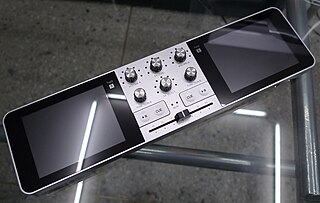 W
WThe Monster Go-DJ is a standalone portable DJ mixing unit from Monster Group.
 W
WA nightclub is a music venue that operates late into the night. A nightclub is generally an entertainment venue comprising a dance floor, lightshow, and a stage for a disc jockey (DJ) where a DJ plays recorded music.
 W
WA variable speed pitch control is a control on an audio device such as a turntable, tape recorder, or CD player that allows the operator to deviate from a standard speed. The latter term "vari-speed" is more commonly used for tape decks, particularly in the UK. Analog pitch controls vary the voltage being used by the playback device; digital controls use digital signal processing to change the playback speed or pitch. A typical DJ deck allows the pitch to be increased or reduced by up to 8%, which is achieved by increasing or reducing the speed at which the platter rotates.
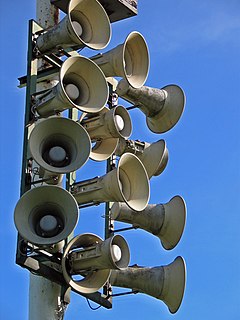 W
WA public address system is an electronic system comprising microphones, amplifiers, loudspeakers, and related equipment. It increases the apparent volume (loudness) of a human voice, musical instrument, or other acoustic sound source or recorded sound or music. PA systems are used in any public venue that requires that an announcer, performer, etc. be sufficiently audible at a distance or over a large area. Typical applications include sports stadiums, public transportation vehicles and facilities, and live or recorded music venues and events. A PA system may include multiple microphones or other sound sources, a mixing console to combine and modify multiple sources, and multiple amplifiers and loudspeakers for louder volume or wider distribution.
 W
WA rave describes a dance party at a warehouse, public or private property, typically featuring performances by DJs playing electronic dance music. The style is most associated with the early 90s dance music scene when DJs played at illegal events in musical styles dominated by electronic dance music from a wide range of sub-genres, including techno, hardcore, house, dubstep, and alternative dance. Occasionally live musicians have been known to perform at raves, in addition to other types of performance artists such as go-go dancers and fire dancers. The music is amplified with a large, powerful sound reinforcement system, typically with large subwoofers to produce a deep bass sound. The music is often accompanied by laser light shows, projected coloured images, visual effects and fog machines.
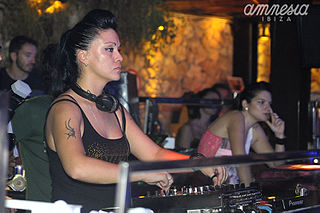 W
WIn the DJ culture, a resident DJ or local DJ refers to a DJ is part of the staff of employees of the club, unlike a guest artist, who works as freelancer, which means that he or she plays on several clubs. Obtaining a residence implies being part of the salaried staff of a company. Unlike a guest, the resident almost inevitably has to conform to certain musical styles dictated by the hiring company. Instead, the resident's sponsorship rests with the club itself, which will probably means greater investment in marketing than if it worked independently.
 W
WIn music, sampling is the reuse of a portion of a sound recording in another recording. Samples may comprise elements such as rhythm, melody, speech, sounds, or entire bars of music, and may be layered, equalized, sped up or slowed down, repitched, looped, or otherwise manipulated. They are usually integrated using hardware (samplers) or software such as digital audio workstations.
 W
WScratching, sometimes referred to as scrubbing, is a DJ and turntablist technique of moving a vinyl record back and forth on a turntable to produce percussive or rhythmic sounds. A crossfader on a DJ mixer may be used to fade between two records simultaneously.
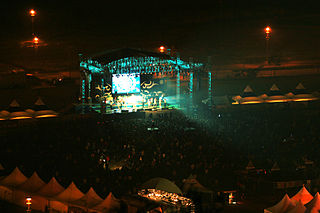 W
WWorld DJ Festival (WDF) is a music festival initiated as the main program of Hi-Seoul Festival in 2007 at the Nanji Campground on the Han River in Seoul, South Korea.The annual World DJ Festival has been the biggest DJ Festival in Korea.
 W
WA sound system is a group of DJs and audio engineers contributing and working together as one, playing and producing music over a large PA system or sound reinforcement system, typically for a dance event or party.
 W
WTurntablism is the art of manipulating sounds and creating new music, sound effects, mixes and other creative sounds and beats, typically by using two or more turntables and a cross fader-equipped DJ mixer. The mixer is plugged into a PA system for live events and/or broadcasting equipment so that a wider audience can hear the turntablist's music. Turntablists manipulate records on a turntable by moving the record with their hand to cue the stylus to exact points on a record, and by touching or moving the platter or record to stop, slow down, speed up or, spin the record backwards, or moving the turntable platter back and forth, all while using a DJ mixer's crossfader control and the mixer's gain and equalization controls to adjust the sound and level of each turntable. Turntablists typically use two or more turntables and headphones to cue up desired start points on different records.
 W
WVinyl emulation allows a user to physically manipulate the playback of digital audio files on a computer using the turntables as an interface, thus preserving the hands-on control and feel of DJing with vinyl. This has the added advantage of using turntables to play back audio recordings not available in phonograph form. This method allows DJs to scratch, beatmatch, and perform other turntablism that would be impossible with a conventional keyboard-and-mouse computer interface or less tactile control devices.
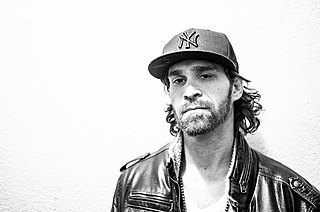 W
W